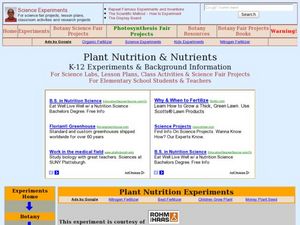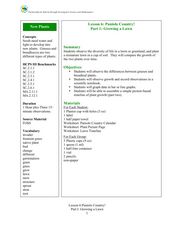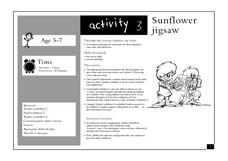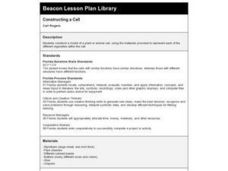Curated OER
Plant Power
Here is an opportunity for your first graders to take a close look at plants: what they need to survive, how they grow, and the names of each plant part. The book, Corduroy's Garden is used to open the lesson. Then, youngsters utilize...
Captain Planet Foundation
Which Plant Is Which?
Learn about dichotomous keys, plant identification, and how to care for the planet with a lesson that includes several hands-on and innovative activities. Kids go on a plant scavenger hunt and classify the plants that they find...
Curated OER
Plants- What Are Their Parts and Functions?
Middle schoolers learn about plants. In this plant function instructional activity, students label the parts of a plant and their functions. Middle schoolers work in small groups to create three simile statements to relate to the...
Curated OER
How to Grow a Sunflower Plant
Young scholars explore botany by conducting a sunflower growth experiment. In this plant life lesson, students identify the anatomy of a sunflower plant and the essential nutrients it requires to grow. Young scholars utilize compost,...
Curated OER
Plant Systems
Second graders learn about plant systems and how plants grow and function. For this plant lesson plan, 2nd graders collect data based on roots, leaves, terrariums, plant uses, and locations of certain kinds of plants. They fill out...
Curated OER
Parts of the Flower and Pollination
Students review the parts of the plant and recognize the parts that are important for pollination. For this pollination lesson, students illustrate and label the parts of a flower. Students compare different types of flowers.
Curated OER
Plant and Animal Cells: Alike and Different?
Seventh graders create a mneumonic device and a graphic organizer about the parts of plant and animal cells. In this biology lesson plan students are introduced to the parts of the cells and then work in groups to create projects that...
Curated OER
Plant Nutrition and Nutrients
Learners observe seeds growth and examine the different parts of the seedling. In this biology lesson, students compare the growth of seeds planted in soil and in hydroponics. They record their observations in their science journal and...
Curated OER
MAKING THREE DIMENSIONAL PLANT AND ANIMAL CELLS
Young scholars create two different cells, one plant and one animal. In this plant and animal cell instructional activity students form groups and construct a part of a cell. Young scholars then put them all together to form one...
Curated OER
Habitat for Plants! There's No Place Like Home!
Students compare and contrast conditions necessary for survival of aquatic and terrestrial plants, identify common and scientific names of plants,
and determine correlation between location and plant characteristics. Students then use...
Curated OER
Understanding the Roots
Students investigate the parts of a flower. In this earth science instructional activity, students read the book The Magic School Bus Plants Seeds and identify various plant parts. Students construct a model of a flowering plant from...
Curated OER
Exploring Texture In the Garden
Students explore the garden environment. In this garden environment lesson, students investigate the needs and parts of a plant. Students discover the differences between fruits and vegetables while creating their own garden.
Curated OER
Growing a Lawn
Students research plant growth. In this plant growth activity, students explore the needs of plants. Students compare and contrast grass and broadleaf plants and grow a miniature lawn in a cup of soil. Resources are provided.
Curated OER
Sunflower Jigsaw
Students recognize and name the main parts of a flower. In this life science lesson, the teacher leads a discussion about the parts of a plant, then students color and cut out the parts of a planet, then glue the parts together...
Curated OER
Cell-O
Young scholars create model cells using gelatin, toothpicks, and various fruits to represent organelles. Then, students observe their models and complete a Venn Diagram comparing and contrasting plant and animal cells.
Curated OER
Constructing a Cell
Third graders, in groups, make a model of a plant or animal cells and represent each of the organelles in the cell.
Curated OER
A Pressing Project
Students create a collection of pressed plants. In this plant lesson, students use newspaper, plywood, and a rubberband to press plants they previously collected.
Curated OER
The Plant Bartering System
Fifth graders explore plant characteristics by viewing a flower and seed presentation. In this environmental adaptation lesson, 5th graders identify specific traits plants have in order to allow them to grow in different climates whether...
Curated OER
Metamorphosis Magic
Learners make different motions for each stage in the butterfly life cycle and plant a garden. In this butterfly life cycle lesson plan, students can take the mini gardens home and discuss how butterflies help gardens.
Curated OER
Examining Seeds
Middle schoolers explore botany by conducting an investigation in class. In this seeds lesson, students utilize lima bean seeds and magnifying glasses to examine the different parts of a seed after it has been dissected. Middle schoolers...
Curated OER
To Light or Not to Light
Students examine the role of light and dark in a living environment. In this photosynthesis lesson, students hypothesize about the best environment for plant growth, record observations using plant seeds in various light and dark...
Curated OER
Plants -- What Are Their Parts and Functions?
Students identify the parts of a flowering plant and their functions. They describe its life cycle as well. They compare the parts of the plant to the roles that are needed in a democracy.
Curated OER
Growing Pains
Students compare common food items with the parts of a plant. They grow their own plants to assess the difficulties in assisting a plant's growth and reproduction.
Curated OER
Photosynthesis
Fifth graders work in small groups to brainstorm responses to a problem related to some disaster that wipes out half or all plant life on earth. Groups complete a graphic organizer to compare and contrast their ideas. Students select...























